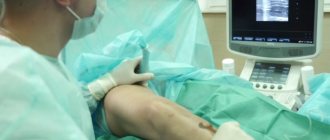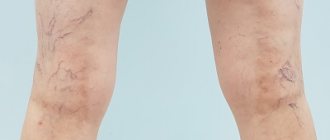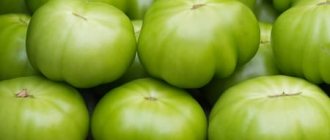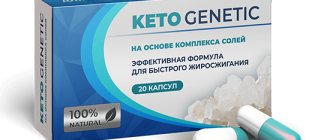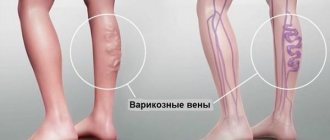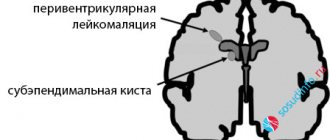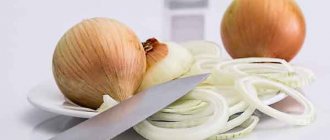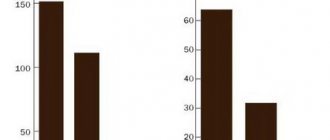How does ointment with horse chestnut work for varicose veins?
Horse chestnut is a tree whose leaves, fruits and bark are used in the preparation of various medicines. The fact is that this tree contains a lot of useful elements such as flavonoids, tannins, pectin and other vitamins.
These substances have a venotonic, anti-inflammatory and blood-thinning effect. Due to their action, they are especially often used to treat varicose veins of the lower extremities.
For ease of use, there are various forms of medications, for example, cream or ointment with horse chestnut for varicose veins. They are used to relieve symptoms of the disease by applying to the area of varicose veins (varicose veins, blue veins on the legs, “stars”, etc.)
For what diseases is horse chestnut used?
Preparations containing horse chestnut are used for:
- vascular atherosclerosis, Raynaud's disease, venous stasis, thrombophlebitis, trophic ulcers of the leg, endarteritis,
- varicose veins, venous congestion,
- neuralgia,
- hemorrhoids,
- gallbladder diseases,
- increased acidity of gastric juice,
- diseases of the spleen (malaria, lymphogranulomatosis), leukemia,
- edema, both renal and cardiac,
- vascular spasms, heart disease, hypertension,
- joint pain, arthritis (including glenohumeral arthritis), rheumatoid arthritis, arthrosis, spinal hernia, gout,
- osteochondrosis, radiculitis, lumbago, muscle inflammation, sciatica,
- diseases of the genitourinary system,
- bronchitis, shortness of breath, bronchial asthma, pulmonary tuberculosis, pleurisy, whooping cough,
- prostatitis, prostate adenoma,
- anemia,
- oncology, radiation sickness,
- uterine bleeding, menopause.
Horse chestnut flowers are used externally in the form of rubbing for diseases of the joints, spine, veins, in the treatment of thrombophlebitis, endarteritis, hemorrhoids and other diseases. Tincture of chestnut flowers is widely used internally for many diseases.
Horse chestnut leaves in the form of complex preparations are used as an anti-inflammatory, analgesic, as well as for vascular diseases, gynecological diseases, and uterine bleeding. Horse chestnut bark is included in complex preparations for joint diseases, is part of stomach preparations, and has an astringent and antipyretic effect.
Contraindications to the use of horse chestnut:
- pregnancy,
- breastfeeding (lactation),
- low blood pressure (hypotension),
- severe liver and kidney diseases, renal failure,
- intestinal atony with constipation,
- children up to 12 years old,
- menstrual irregularities.
In case of an overdose when taken orally, there may be heartburn, nausea, and pain in the heart area.
Is it possible to make your own ointment with horse chestnut for varicose veins?
Yes, there is nothing complicated about preparing ointment at home. To do this, you will need tree fruits and animal fat. You need to take 50 grams of fruit and grind it to flour. Then place the chestnut in a non-stick bowl and mix with animal fat (badger fat will do).
Place on the fire and simmer until low heat for about 40 minutes. After this, remove the ointment from the heat and let it cool. Transfer the resulting product to a convenient, clean container.
This method of preparing the product is very convenient and does not require much effort. At the same time, the resulting ointment can be used for prophylactic purposes and as a component of complex therapy for varicose veins. An ointment with this composition improves blood circulation in the legs, has a venoprotective effect and reduces feelings of fatigue.
Contraindications to the use of ointments
The use of creams and ointments based on horse chestnut has a number of contraindications:
- Do not use medications if you are allergic to the components they contain;
- Use is prohibited if there are wounds on the skin surface;
- The presence of skin diseases such as psoriasis or dermatitis is also a prohibiting factor;
- Pregnancy and lactation;
- Inflammatory processes in the intestinal tract;
- Cannot be used in the diagnosis of renal failure;
- Low blood clotting.
Contraindications exist due to the fact that the components included in the drug are quickly absorbed through the walls of blood vessels. They are also distributed through the bloodstream throughout the body.
What is better: making your own ointment with horse chestnut for varicose veins or buying a ready-made one?
Above we wrote a simple way to prepare an ointment at home, but if for some reason you can’t make it at home, then this remedy can be easily found in a pharmacy. In addition to horse chestnut, other useful plant extracts can usually be found in such ointments. For example: ginkgo biloba, green tea, grape leaves and various oils.
Each of these components has a positive effect on the human circulatory system, so some store-bought ointments with horse chestnut for varicose veins are even preferable.
Nutrition for varicose veins
Nutrition for varicose veins changes by 100%, and we are not talking about caloric content, but about the usefulness of food and saturating the body with vitamins and minerals.
Fact: conservative treatment of dilated veins gives results in the initial stages, which are manifested by heaviness in the legs and swelling. Compression hosiery, therapeutic exercises and a balanced diet will help you get rid of the pathology or significantly alleviate symptoms.
Specialists give the client a memo indicating a list of prohibited and permitted products. For this pathology, you should give preference to the following products:
- Oranges, grapefruits, lemons and other citrus fruits, which contain a large amount of vitamin C in an accessible form (easily absorbed).
- Seaweed, shrimp and salmon are highly desirable.
- Apples and oatmeal help cleanse the gastrointestinal tract and improve the absorption of microelements.
The diet for varicose veins has the main goal - strengthening blood vessels and venous walls, transporting vitamins and minerals into the tissue, and getting rid of excess weight. Often, it is excess weight that slows down blood flow and increases the load on the legs, which leads to deterioration of the valves. If you get rid of extra pounds, the blood will return to the heart faster, and you will get rid of stagnation.
Natural or artificial vitamins?
Expert opinions still differ. Often the emphasis is on artificial vitamins, which contain the entire complex of useful substances. But it is necessary to normalize nutrition for varicose veins, since chemical vitamins are not absorbed 100%. The quality of absorption of natural food is several times higher, since it is natural to our body.
Prefer fresh vegetables in the form of cabbage, cucumbers, lettuce, tomatoes, bell peppers. People report improved health when following a diet. This is due to the natural water content in vegetables and fiber, which instantly delivers all vitamins and minerals to the tissues. For the health of blood vessels and veins, you need to use as many products as possible that contain vitamins P and C. Often, as part of a treatment complex, people are prescribed Ascorutin vitamins, which contain large quantities of these elements.
Be sure to consume citrus fruits unless you are allergic. These are lemons, oranges and grapefruits. An increased amount of vitamins is also found in walnuts (ripe or green). Diet for varicose veins should include all of the listed fruits and vegetables.
Green tea without sugar is highly desirable. Choose high-quality Chinese tea and forget about the usual tea bags. Whole leaves are needed, as they contain all the beneficial components unchanged.
You should not drink liquid in large quantities, even if we are talking about filtered or spring water. A huge volume of water more than 2 liters per day will complicate the movement of blood and can lead to swelling.
What foods are strictly prohibited?
It's not just about the products, but also about the cooking methods. Diet for varicose veins excludes fatty, salty and fried foods. For example, you can eat boiled, baked or steamed potatoes, but never fried ones.
Forget about cheese, mayonnaise, fatty sour cream. Fatty meat is prohibited, especially pork and lamb. These foods significantly increase the level of bad cholesterol in the blood.
To consult about your diet and find out more, contact our consultant right now.
Is it possible to refuse surgical treatment in favor of ointment with horse chestnut for varicose veins?
No, you can't do this. If a phlebologist, after an examination, recommends surgical treatment of varicose veins, this means that the dilation of the veins has reached pronounced values. No creams or medications can return blood vessels to their previous state. In such situations, the only correct solution is to remove varicose veins.
Fortunately, today's technologies make it possible to do this without harm to health, without pain and without complications. The main methods that are now actively used are Laser surgery and Radiofrequency Ablation. These procedures have virtually nothing in common with standard surgical treatment.
They are based on access to the vein through a minimal incision (a few mm) and the avoidance of general anesthesia. And vascular sclerosis refers to non-operative treatment methods, during which a specialized drug is injected into the lumen of the vein. Sclerotherapy is especially effective in the initial stages of the disease.
Creams and ointments for varicose veins can speed up recovery in the postoperative period. In this regard, they are often prescribed by phlebologists.
Benefits of using horse chestnut ointments
Ointments have a local effect on the affected area of the vessel, so they are very widely used in modern medical practice.
The main advantages of this dosage form are that the ointment quickly relieves swelling and eliminates inflammation.
The effectiveness of ointments is very high, because the active substance is an active biological substance. Also, ointments, gels and creams based on horse chestnut are an excellent preventive measure.
With regular and frequent use of this drug, the condition of the blood vessels in the legs significantly improves. Swelling and inflammation disappear.
General information about the medicinal properties of chestnut fruits
Chestnut fruit tincture has a beneficial effect not only on the legs, but also on the entire body:
- strengthens the immune system;
- treats inflammation;
- lowers blood pressure;
- removes salts, toxins and waste;
- normalizes stomach acidity;
- restores digestion;
- accelerates wound healing;
- protects against stress.
Horse chestnut fruits are taken in the treatment of hemorrhoids, gastritis, hypertension, gout, rheumatism, and osteochondrosis. Horse chestnut fruits are also used for sinusitis, rhinitis, tracheitis, bronchitis, bronchial asthma, pleurisy, tonsillitis, laryngitis, tuberculosis, influenza, whooping cough, colds, ARVI. The use of horse chestnut for men will help increase potency, cure prostatitis and prostate adenoma, and for women - cope with fibroids and mastopathy, and normalize the menstrual cycle.
The natural remedy, unlike purchased drugs, does not contain chemical additives and does not have a number of side effects. In addition, the price of chestnut fruits is much lower than that of conventional medicines.
